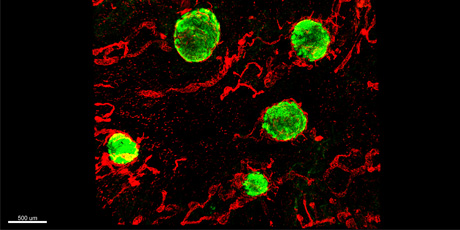Our research group focuses on mucosal immunology, with a particular interest in stromal cell and dendritic cell biology.
The intestinal mucosa represents the largest surface of the body and is continually exposed to foreign material derived from our diet and the estimated 1014microorganisms residing within the intestinal lumen.
Maintenance of intestinal homeostasis is dependent upon the immune system’s ability to remain tolerant to such material, while retaining the ability to mount appropriate immune responses to the many viral, parasitic and bacterial pathogens that utilize the intestine as a primary site of entry into the host. A breakdown in these mechanisms can result in intestinal pathology and is believed to contribute to the development and maintenance of inflammatory bowel diseases, including Crohn’s disease and ulcerative colitis, as well as food hypersensitivities such as celiac disease.

The laboratory focuses on understanding the mechanisms regulating intestinal mucosal immune responses in health and disease, with an aim to finding novel modalities for treatment of human disease and vaccine therapies against mucosal pathogens. Our focus is on the role of antigen presenting cells, in particular dendritic cells, as well as intestinal stromal cells in the regulation of mucosal immune responses.
Dendritic cells are innate immune cells that acquire antigens in peripheral tissues and then migrate to local tissue-draining lymphoid tissues, where they present self and foreign-derived antigens to cells of the adaptive immune system. We, and others, have recently identified several subtypes of intestinal dendritic cells, each with a unique ontogeny and functionality in driving mucosal adaptive immune responses.
Stromal cells are non-hematopoietic mesenchymal-derived cells that primarily have been implicated in tissue organization events. Our recent studies point to a marked complexity in stromal cell subset composition and function, and it is becoming increasingly clear that they may also contribute to the regulation of local immune responses.
Our aim is to better understand how dendritic and stromal cells subtypes contribute to the generation and regulation of immune responses in the intestine in homeostasis and disease settings.
To study this, we combine the use of state-of-the-art transgenic animal models with cellular and molecular studies of human intestinal biopsies and re-section material. Key technologies include multi-parameter flow cytometry and imaging techniques, sequencing technologies (including single cell RNAseq (10x, Drop-seq), animal models of immune cell functionality, infection and inflammation, and in vitro co-culture techniques.